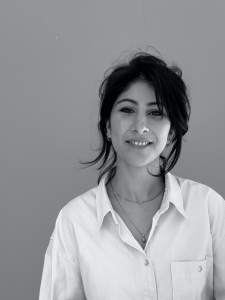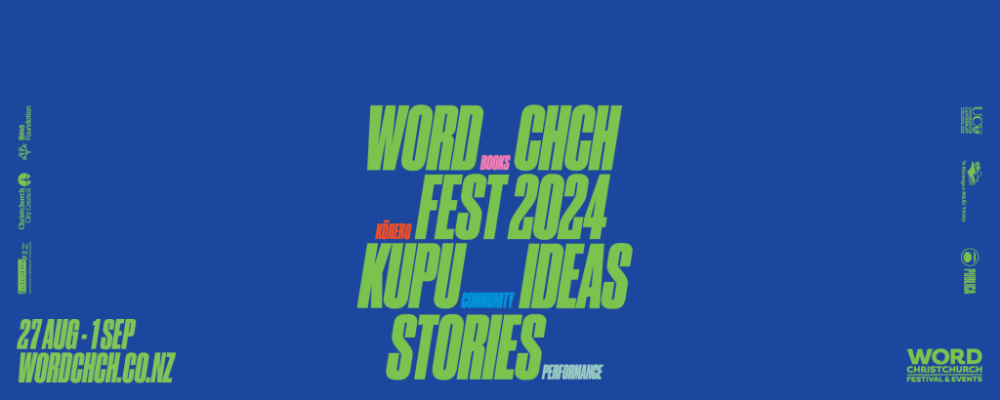WORD CHCH Literature Festival 2024: 13th Floor Report
The 13th Floor’s Shamin Yazdani headed south to Christchurch to take in the WORD CHCH Literature Festival. Here is her report:
I spent the better part of last week in Ōtautahi Christchurch at WORD CHCH (literature festival). The weather was in good spirits and so was I. I spent my days journeying into town, a novel 10 minute drive in contrast to my usual Auckland commute, catching a selection of eclectic talks with writers from different corners of Aotearoa. Some were based in/with ties to Ōtautahi, some from further afield, or a combination of both. The six days, while fleeting, were eye opening and inspiring, not only with regards to the festival, but the way the buzz and impact of its presence cast a flattering soft warm ‘golden hour’ glow over the often harshly lit city that is Ōtautahi / Christchurch.
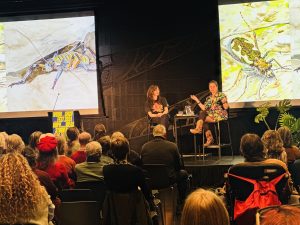 As the days unfolded, so too did an array of themes and topics: the natural world, community, identity, m/otherhood, de/colonialisation, displacement, connection, home(coming) – to name a few. For me, the throughline of WORD was pronounced: a place to take up space; engage with diverse perspectives, connect dots, and ultimately, provide a platform for changemakers and trailblazers, many of whom sit at the intersection of the fringe and the conventional, their representation often absent in society. And thus, they move through this world with intention and conviction, trying to forge new paths.
As the days unfolded, so too did an array of themes and topics: the natural world, community, identity, m/otherhood, de/colonialisation, displacement, connection, home(coming) – to name a few. For me, the throughline of WORD was pronounced: a place to take up space; engage with diverse perspectives, connect dots, and ultimately, provide a platform for changemakers and trailblazers, many of whom sit at the intersection of the fringe and the conventional, their representation often absent in society. And thus, they move through this world with intention and conviction, trying to forge new paths.
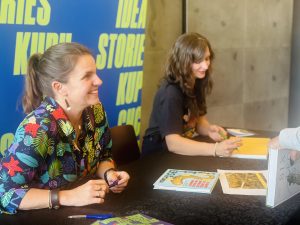 My first day at WORD started in the natural world (via Tūranga TSB space) at Critters of Aotearoa and Six Legged Ghosts with author and illustrator Lily Duval and conservationist and author (and self proclaimed eternal optimist) Nicola Toki. The dynamic duo discussed the urgency and value of returning to nature and the need to tell stories of hope; acknowledging the problems we face AND demonstrating the solutions.
My first day at WORD started in the natural world (via Tūranga TSB space) at Critters of Aotearoa and Six Legged Ghosts with author and illustrator Lily Duval and conservationist and author (and self proclaimed eternal optimist) Nicola Toki. The dynamic duo discussed the urgency and value of returning to nature and the need to tell stories of hope; acknowledging the problems we face AND demonstrating the solutions.
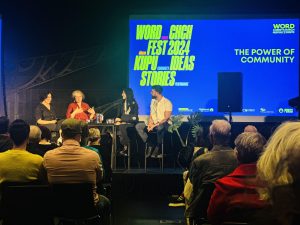 I later attended The Power of Community, where UC Scholar Mahdis Azarmandi reflected on our roots as something to “take us places as opposed to hold us down” and novelist and essayist Tina Makereti commented on the importance of creating opportunities for tauiwi of colour and tangata whenua to connect, and how perhaps the best demonstration of proactive measure is to “be nerdy about it and actively create organisations” for the purpose of friendship – love! I walked away from the Risky Women panel yearning
I later attended The Power of Community, where UC Scholar Mahdis Azarmandi reflected on our roots as something to “take us places as opposed to hold us down” and novelist and essayist Tina Makereti commented on the importance of creating opportunities for tauiwi of colour and tangata whenua to connect, and how perhaps the best demonstration of proactive measure is to “be nerdy about it and actively create organisations” for the purpose of friendship – love! I walked away from the Risky Women panel yearning 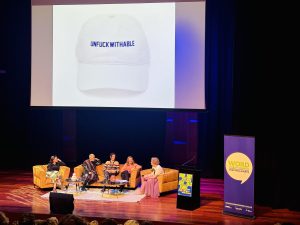 (admittedly not for the first time nor the last) that Anika Moa and Ngahuia Te Awekotuku (and Susie Ferguson!) were my besties – so funny, so in their own lane, so unapologetically themselves! These women are proponents of the connection between being in service and leaning into our own personal mana – a sentiment that deeply resonates with me. Listening to them speak, and witnessing their energy was so validating and inspiring, and I’m inclined to think the other couple of hundred women in the room – and probably the handful of blokes – would agree!
(admittedly not for the first time nor the last) that Anika Moa and Ngahuia Te Awekotuku (and Susie Ferguson!) were my besties – so funny, so in their own lane, so unapologetically themselves! These women are proponents of the connection between being in service and leaning into our own personal mana – a sentiment that deeply resonates with me. Listening to them speak, and witnessing their energy was so validating and inspiring, and I’m inclined to think the other couple of hundred women in the room – and probably the handful of blokes – would agree!
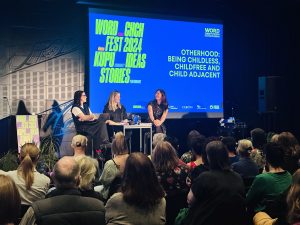 Meanwhile, the Otherhood (Essays on being childless child-free and child adjacent) panel with editor Lil O’Brien and contributor Lily Duval was a space to discuss, ask questions, “feel angry, full of rage, grief, at peace…”. The anthology explores topics including religion, blended families, bereavement, Te Ao Māori, queerness, the foster care system disability, infertility, domestic violence, abortion, freedom from social expectations. O’Brien and Duval were brilliant at maintaining a lightness to what could have otherwise been a very
Meanwhile, the Otherhood (Essays on being childless child-free and child adjacent) panel with editor Lil O’Brien and contributor Lily Duval was a space to discuss, ask questions, “feel angry, full of rage, grief, at peace…”. The anthology explores topics including religion, blended families, bereavement, Te Ao Māori, queerness, the foster care system disability, infertility, domestic violence, abortion, freedom from social expectations. O’Brien and Duval were brilliant at maintaining a lightness to what could have otherwise been a very 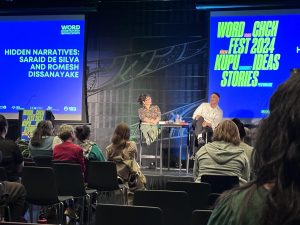 heavy session. Hidden Narratives with writers Saraid de Silva and Romesh Dissanayke was an intimate discussion about diasporic narratives that, due to my clashing schedule, ensured I was late enough to miss some valuable insights on process, but just in time to catch de Silva throwing some warranted shade at western ideas of liberation.
heavy session. Hidden Narratives with writers Saraid de Silva and Romesh Dissanayke was an intimate discussion about diasporic narratives that, due to my clashing schedule, ensured I was late enough to miss some valuable insights on process, but just in time to catch de Silva throwing some warranted shade at western ideas of liberation.
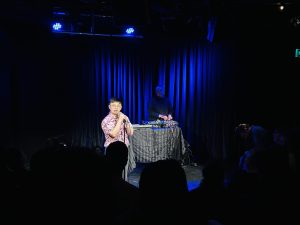 Last but certainly not least, a special mention to Homecoming Poems Live. A truly beautiful marriage of spoken word by Nathan Joe and a live score with deconstructed club music by Bea Gladding (aka Meaty Boy), the performance explored reflections of leaving and coming home. Delicate and intimate, smart and funny, vulnerable, and above all, steeped in conviction. One thing is for sure: Nathan Joe writes for himself. That is what makes his voice so genuine, relatable, and commanding of your (my) attention, your (my) laughter, your (my) tears.
Last but certainly not least, a special mention to Homecoming Poems Live. A truly beautiful marriage of spoken word by Nathan Joe and a live score with deconstructed club music by Bea Gladding (aka Meaty Boy), the performance explored reflections of leaving and coming home. Delicate and intimate, smart and funny, vulnerable, and above all, steeped in conviction. One thing is for sure: Nathan Joe writes for himself. That is what makes his voice so genuine, relatable, and commanding of your (my) attention, your (my) laughter, your (my) tears.
As I reflect on the evening, I’m transported back to the dark room of the Little Andromeda theatre, the fusion of parallels and variables in our life experiences (a 2.5 generation Chinese Queer 30something from Christchurch, based in Tāmaki Makaurau and a first generation Iranian 30something from Christchurch, based in Tāmaki Makaurau) weaving and synthesising; In that moment I am holding space for him and he holds space for me (but not without catapulting me onto an emotional, intellectual, energising, soul-stirring roller – is there anything more beautifully true to life than that?).
As the set comes to a close, Joe leaves the audience not with his own words, but a salient quote from K Emma Ng’s book, Old Asian, New Asian: “It is easy to demand acceptance as New Zealanders from Pakeha, it is much more difficult to ask for the same from Māori. We have all seen how easy it is for the desire to belong to teeter and slip into a neocolonial agenda of laying claim to a place. How can we belong here, become from here, without reenacting the violence that is historically embedded in the gesture of trying to belong…”. All in all, Joe’s insights were anchored in themes that (though only some of us pro/actively engage with) are relevant to us all: Love, Home, Identity and Belonging. I have all the time in the world for these subjects, and for Nathan Joe.
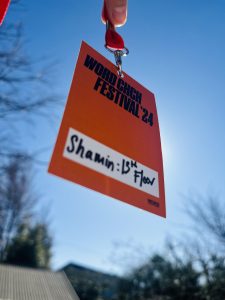 And with that, my WORD round up comes to a close. My takeaway? It has been inspiring and heartwarming to witness the commitment and dedication to this city, Ōtautahi. I commend those who are active in feeding their voice and identity into its nurturing. For me, it has been a reminder of Erich Fromm’s sentiments, that love is an active power of wo/man – the art of loving is in essence care, responsibility, respect, knowledge and ultimately a choice. To love this city is to care for it and take responsibility for it. It’s a highly intersectional undertaking. I’ve also been thinking about the awe-inspiring wealth of talent and insight brimming from the marginalised communities of this country. I can’t help but wonder though about the potential of what (and who) could have flourished had there been more opportunity to connect and be platformed in their earlier years. Going forward I would love to see more events and festivals like WORD, and better accessibility (read: FREE!). I may be biased, but I think our creatives and storytellers are some of our brightest people – we need to listen to them, and the key to that is ACCESS. Engaging with and having access to culture, the arts, inspiration and education is instrumental to our collective wellbeing.
And with that, my WORD round up comes to a close. My takeaway? It has been inspiring and heartwarming to witness the commitment and dedication to this city, Ōtautahi. I commend those who are active in feeding their voice and identity into its nurturing. For me, it has been a reminder of Erich Fromm’s sentiments, that love is an active power of wo/man – the art of loving is in essence care, responsibility, respect, knowledge and ultimately a choice. To love this city is to care for it and take responsibility for it. It’s a highly intersectional undertaking. I’ve also been thinking about the awe-inspiring wealth of talent and insight brimming from the marginalised communities of this country. I can’t help but wonder though about the potential of what (and who) could have flourished had there been more opportunity to connect and be platformed in their earlier years. Going forward I would love to see more events and festivals like WORD, and better accessibility (read: FREE!). I may be biased, but I think our creatives and storytellers are some of our brightest people – we need to listen to them, and the key to that is ACCESS. Engaging with and having access to culture, the arts, inspiration and education is instrumental to our collective wellbeing.
All of this to say, as a first generation POC who grew up in pre-quake Christchurch, then lived in the vibrant multicultural metropolis that is London for nearly a decade, and is now Tāmaki Makaurau-based, ‘Ōtautahi’ doesn’t roll off the tongue for me just yet, but with the presence of the likes of WORD CHCH, I am hopeful a change is gonna come.
Shamin Yazdani
Shamin is an Iranian New Zealander and multi-hyphenate creative engaged in storytelling across diverse mediums and platforms. She began her professional journey in the UAE and London, steadily advancing to creative producing in broadcast television. Shamin’s contributions in film and creative direction have featured on various platforms and publications including BBC World News, Vogue Arabia, Elle Arabia, Harper’s Bazaar Arabia, The Gulf Film Festival, MENA Film Festival, London Shubbak Festival and more.
